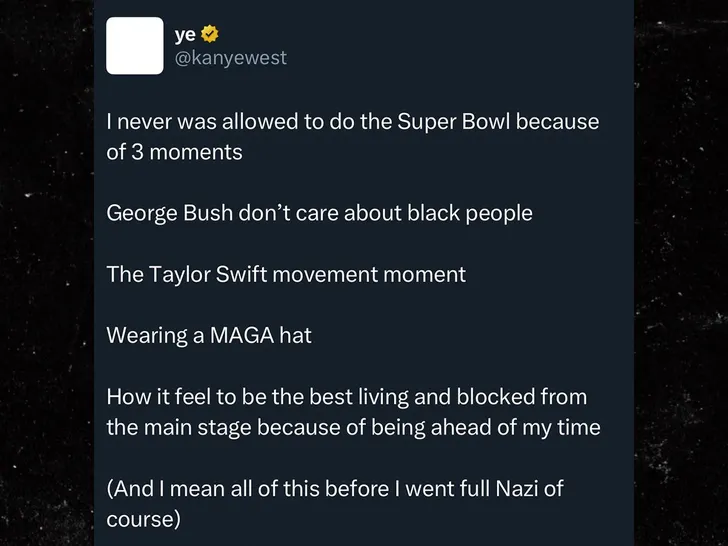Kanye West has once again stirred controversy by resurrecting his long-standing feud with Taylor Swift—this time in the context of the Super Bowl halftime show.
In a now-deleted post on X, formerly Twitter, the rapper speculated on why he has never been invited to headline the Super Bowl’s iconic performance slot.
Among the reasons he cited was what he described as the “Taylor Swift moment,” suggesting that their infamous 2009 MTV VMAs clash continues to cast a shadow over his career more than a decade later.
In his post, West listed three incidents he believes have prevented him from reaching the Super Bowl stage: his on-air criticism of President George W. Bush during a Hurricane Katrina fundraiser, his open support of Donald Trump—which included wearing a red MAGA hat—and the now-infamous moment when he interrupted Taylor Swift during her acceptance speech.
West’s claim that these moments led to him being “banned” from the NFL’s grandest stage reignites conversations about his public persona, artistic legacy, and turbulent relationship with pop culture.
The “Taylor Swift moment” he refers to took place at the 2009 MTV Video Music Awards. As Swift was accepting her award for Best Female Video, West stormed the stage to protest, declaring that Beyoncé had “one of the best videos of all time.”
The incident became a defining moment in award show history and sparked widespread condemnation of West’s behavior. While he later apologized publicly, the damage had been done, and the two artists became forever linked by that moment of disruption.
Their relationship grew even more strained in 2016 when West released the song “Famous,” in which he claimed he “made that bitch famous”—a reference to Swift.
The line was met with outrage, particularly from Swift’s fans and feminist circles, while West insisted she had approved the lyric.
Swift’s camp countered this claim, stating that while she was contacted about the song, she never agreed to being called a “bitch” nor endorsed the track’s messaging.

The back-and-forth sparked renewed hostility and made their feud a media circus once more.
From that point on, the two megastars have navigated their careers with very different strategies. West leaned deeper into provocation—politically, socially, and artistically—while Swift has largely remained silent on the issue, choosing instead to redirect the conversation through her music.
Despite their silence toward each other in recent years, the tension has lingered in the background of both artists’ public personas, especially as West continues to frame their fallout as a pivotal blow to his brand.
In his recent social media post, West appeared to shift blame for his sidelining away from his more recent controversies—including antisemitic comments and erratic political moves—and toward what he seems to believe is a long-standing institutional grudge.
By placing Swift at the center of this alleged blacklisting, West paints himself as a victim of cancel culture and unfair industry gatekeeping. “They banned me before I wore the red hat,” he allegedly wrote, indicating he believes his exclusion began long before his Trump-era stunts.
This narrative, however, overlooks the series of deeply troubling actions and statements West has made in recent years.
His association with hate speech, as well as incendiary public appearances, has rendered him a divisive figure even among his once-loyal fanbase.
The NFL’s hesitation to book him likely stems from concerns about unpredictability and potential backlash, rather than a moment of pop drama from more than a decade ago.
Taylor Swift, despite her past involvement in the feud, is hardly the deciding factor in such high-stakes corporate decisions.
Moreover, dragging Swift into the spotlight once again—without provocation or current relevance—seems more like a calculated deflection than an honest reflection.
West’s repeated need to revisit their conflict suggests an unwillingness to confront the consequences of his more recent choices.
Rather than accepting that his own conduct may have made him an undesirable halftime act, he appears to be scapegoating a long-ago incident with an artist who has since moved on.
For her part, Taylor Swift has maintained a pattern of silence when it comes to West’s periodic provocations. This latest incident is no exception.
Despite being name-dropped yet again in a narrative not of her making, Swift has offered no public response.
This deliberate lack of engagement has become her way of reclaiming control—refusing to be pulled into yet another public spectacle fueled by drama.
As Kanye West continues to grapple with the fallout of his own actions, the Super Bowl halftime show remains a stage he’s unlikely to occupy anytime soon.
While he argues that his absence is due to past grudges and misunderstood artistry, many observers believe it is a result of a pattern of harmful behavior and divisive rhetoric.
For now, West’s claim serves more as a reflection of his own struggles with accountability than a legitimate critique of the entertainment industry.
In the court of public opinion, this latest episode further distances West from the musical and cultural relevance he once commanded.
Meanwhile, Taylor Swift continues her ascent, headlining sold-out tours and earning accolades. If anything, this revived feud underscores the different trajectories their careers have taken: one defined by reinvention and restraint, the other by controversy and chaos.







